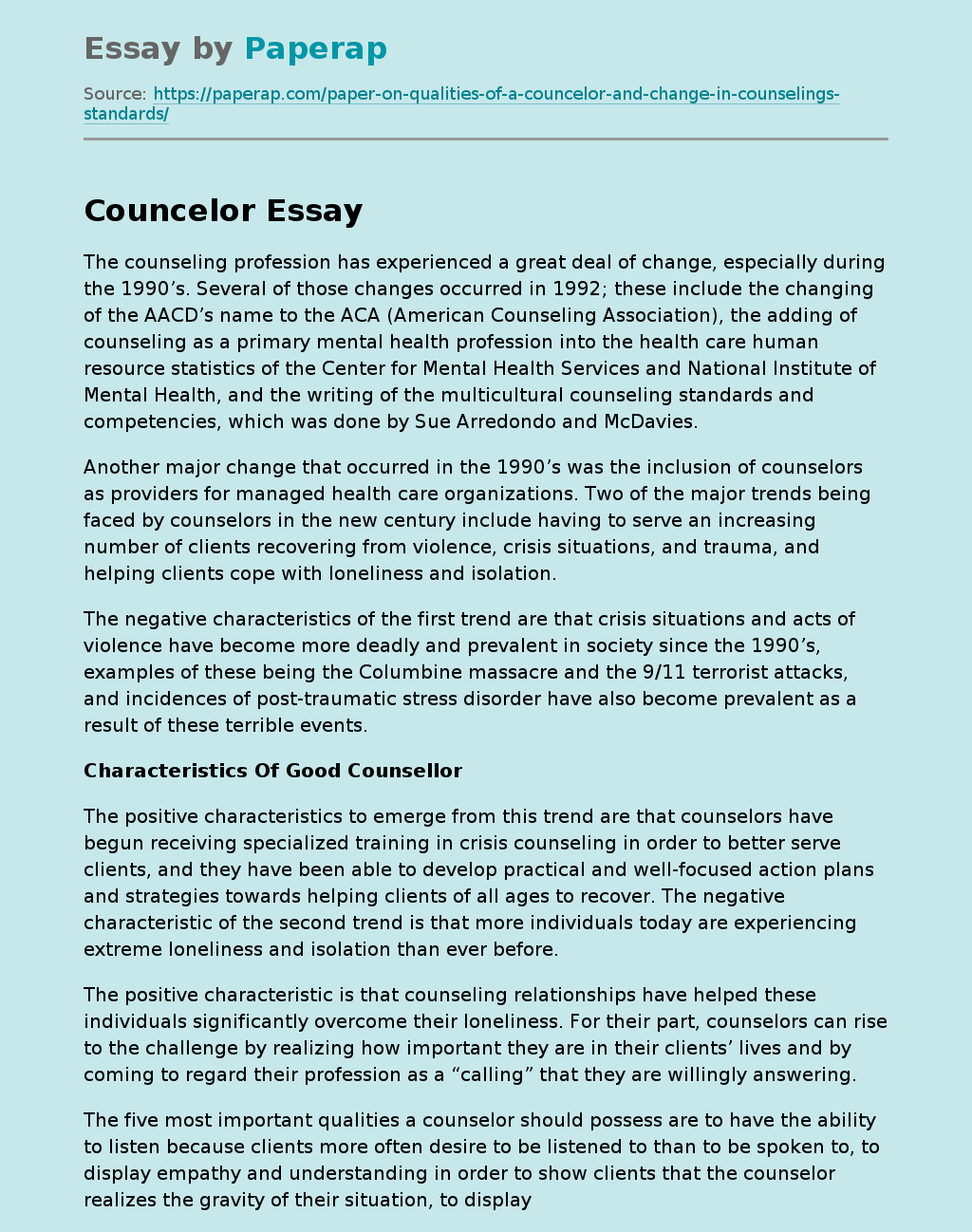Counseling Profession in Transition
The following sample essay on “Councelor”: tells about the counseling profession and how it has experienced a great deal of change, especially during the 1990’s.
Several of those changes occurred in 1992; these include the changing of the AACD’s name to the ACA (American Counseling Association), the adding of counseling as a primary mental health profession into the health care human resource statistics of the Center for Mental Health Services and National Institute of Mental Health, and the writing of the multicultural counseling standards and competencies, which was done by Sue Arredondo and McDavies.
Another major change that occurred in the 1990’s was the inclusion of counselors as providers for managed health care organizations. Two of the major trends being faced by counselors in the new century include having to serve an increasing number of clients recovering from violence, crisis situations, and trauma, and helping clients cope with loneliness and isolation.
The negative characteristics of the first trend are that crisis situations and acts of violence have become more deadly and prevalent in society since the 1990’s, examples of these being the Columbine massacre and the 9/11 terrorist attacks, and incidences of post-traumatic stress disorder have also become prevalent as a result of these terrible events.
Characteristics Of Good Counsellor
The positive characteristics to emerge from this trend are that counselors have begun receiving specialized training in crisis counseling in order to better serve clients, and they have been able to develop practical and well-focused action plans and strategies towards helping clients of all ages to recover.
The negative characteristic of the second trend is that more individuals today are experiencing extreme loneliness and isolation than ever before.
The positive characteristic is that counseling relationships have helped these individuals significantly overcome their loneliness. For their part, counselors can rise to the challenge by realizing how important they are in their clients’ lives and by coming to regard their profession as a “calling” that they are willingly answering.
The five most important qualities a counselor should possess are to have the ability to listen because clients more often desire to be listened to than to be spoken to, to display empathy and understanding in order to show clients that the counselor realizes the gravity of their situation, to display emotional insightfulness so that one can tolerate and expect all types of emotions to come forth, to have the ability for self-denial so that one learns to take care of others before treating one’s own needs, and to possess tolerance of intimacy which is essential since most counselor-client relationships are often long-term and very personal.
In order to improve themselves professionally throughout their careers counselors must first realize that competency within the profession is directly related to how they function on a personal level. Due to this counselors should become self-aware of their personalities and attitudes, learn from their own emotional experiences while maintaining emotional stability and maturity, successfully integrate whatever counseling techniques and knowledge they acquired into their own lives, and learn to prevent or treat stress and burnout on the job.
The developmental/wellness approach emphasizes that people engage in certain patterns of behavior through the various ongoing developmental stages in life. Counselors using this approach, therefore, would view a client based upon which stage his/her problem is emanating from. Oftentimes, these counselors believe that behaviors that are suitable for one stage may not be so for another. In contrast a counselor who abides by the medical/pathology approach would view a client based upon what symptoms, listed in the Diagnostic and Statistical Manual of Mental Disorders, of psychological problems he/she displays.
Another point of comparison reveals that both do share the notion that external environmental and social factors must be taken into consideration when diagnosing and treating clients’ problems. The benefits of ethical codes are that they can serve as guidelines for helping counselors to arrive at solutions to ethical dilemmas, they demonstrate the increasing level of professionalism that the field of counseling has recently experienced, and they keep counselors liable for any misfired attempts towards solving ethical dilemmas without consulting the codes first.
The limitations of these codes are that they cannot resolve certain issues, are often unenforceable, contradictions may exist within the codes, legal and ethical codes may come into conflict, and they often do not address cross-cultural issues, among other things. For making ethical decisions counselors can use the codes listed by the professional counseling associations to which they belong to and consult with colleagues, legal professionals, casebooks, or principles.
There are three instances in which a counselor may be sued for malpractice; the first one is when a counselor may have to face civil liability malpractice suits for supposed invasion of privacy. The second instance of a counselor facing a civil liability malpractice suit is when a counselor is accused of defamation. The third instance of a counselor facing a malpractice suit, this time for criminal liability, is when he/she is accused of serving as an accessory to a crime.
The steps that counselors can take in order to avoid malpractice suits are to familiarize themselves with those elements of the law that are shared by both the mental health and legal professions, to recognize those elements of the law that are not to be found in the mental health culture, to continuously review the ethical codes of the professional counseling associations, and finally to consult with colleagues and legal professionals over ways to overcome certain ethical-legal dilemmas.
Counseling Profession in Transition. (2019, Dec 05). Retrieved from https://paperap.com/paper-on-qualities-of-a-councelor-and-change-in-counselings-standards/

